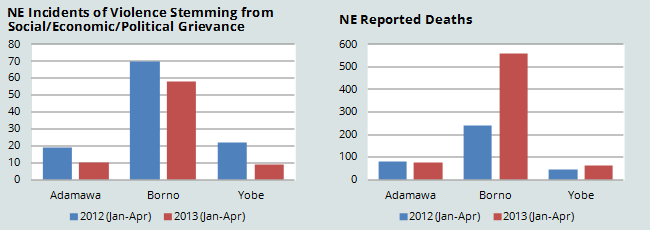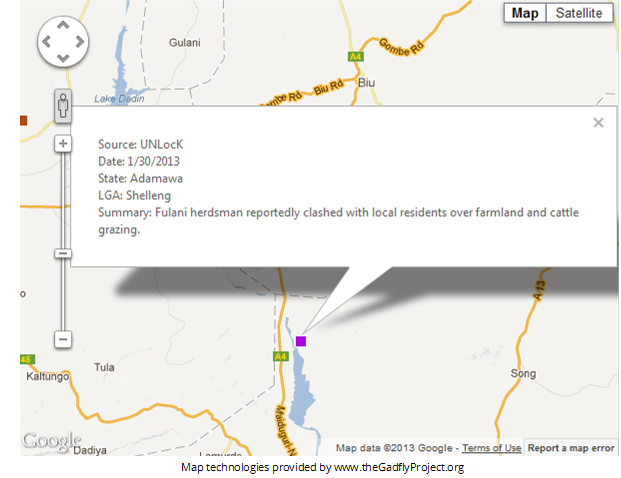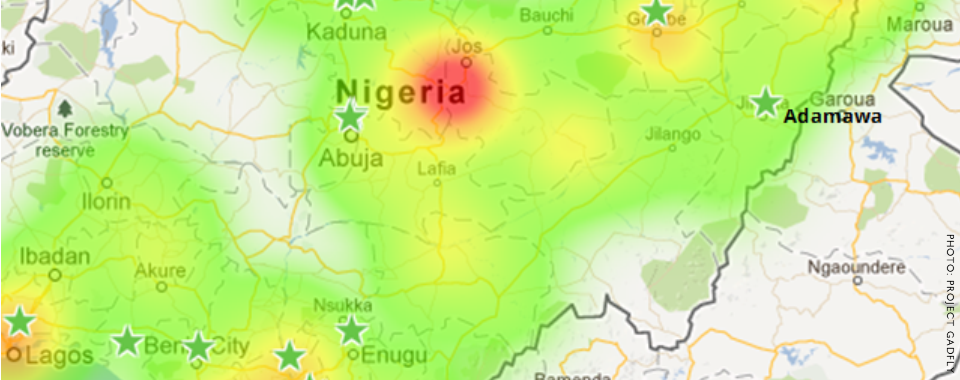BY NATE HAKEN AND BENJAMIN KAUFMAN
On 15 May 2013, President Goodluck Jonathan imposed a state of emergency in three states in northeastern Nigeria. In a televised statement, he called for “extraordinary measures to restore normalcy” in Borno, Yobe and Adawama states, where the domestic non-state armed group(s) Jama’atu Ahlus-Sunnah Lidda’Awati Wal Jihad (JAS), commonly known as Boko Haram, primarily operates. [1]
A heat map of violent incidents compiled by The Council on Foreign Relations’ Nigeria Security Tracker [2] and collated by Partners for Peace (P4P) [3] shows the relative distribution of grievance-driven insecurity in the period between January and April 2013 (red being the most severe).
In April 2013, the Nigeria Stability and Reconciliation Programme cited local observers as suggesting that violence in Borno was thought to be spilling into localized areas of Yobe and Adamawa. [4] Indeed, depending on the baseline, a Local Government Area-level assessment using the P4P Peacebuilding Map (www.p4p-nigerdelta.org) does show fluctuations in certain pockets. During this period at the state level, however, Yobe and Adamawa actually had fewer reported incidents of violence than several other regions of the country not included in the state of emergency. And the overall trends in reported incidents and fatality estimates do not show a general deterioration in the security situation in Yobe and Adamawa, broadly speaking. Nevertheless, there are certainly ongoing issues of violence that need to be addressed for the sake of peaceable livelihoods and sustainable human security as well as the stability of the Nigerian state.
Since the beginning of 2012, this is the second declaration of a state of emergency in the region, the last one being focused on targeted local government areas in Borno, Yobe, Niger, and Plateau from January-July 2012. [5] To put the current situation in perspective: when the frequency of incidents and reported fatalities in January-April 2012 are compared with the same period in 2013, data suggest that while the number of fatalities in Borno is significantly higher this year, Adamawa and Yobe remain at comparable overall levels of insecurity, if not slightly improved.

Incidents of Violence and Fatality Estimates in Adamawa and Yobe as Tallied by the NST and Collated by P4P Comparing Jan-April in 2012 with 2013
In both Adamawa and Yobe states, the Nigeria Security Tracker data suggest an improvement since late 2012 when many were reportedly killed in Mubi (Adamawa) and insurgency/counter-insurgency activities reportedly resulted in the death of dozens in Yobe (particularly Damaturu and Potiskum).

Incidents of Violence and Fatality Estimates in Adamawa and Yobe as Tallied by NST and Collated by P4P by month from November 2011-April 2013
Engaging Civil Society
Assessing conflict risk involves more than just tallying casualties and incidents of violence. Social and economic factors must also be taken into consideration. And for effective conflict mitigation, civil society needs to be a part of the assessment process so that their priorities and concerns are reflected in the framework, findings, and recommendations of the analysis. To that end, UNLocK workshops with civil society have been held in Nigeria about every three months since 2010 in Port Harcourt or Kaduna with representatives from across the country to assess the risk of human insecurity.
Since January 2013, UNLocK participants in Adamawa have reported incidents of inter-communal clashes over farmland and cattle grazing, as well as attacks on villages, markets, and one on a beer depot. It was not always clear from these reports which violence was directly related to JAS militancy and which was primarily criminal or communal in nature. However security forces reportedly undertook house-to-house searches in the city of Jimeta in February after a killing was reported that was believed to be JAS-related.

Screenshot of P4P Peacebuilding Map Showing an example of an UNLocK report in Adamawa about communal violence between herdsmen and farmers in January 2013.
While violence has been a concern of civil society in Adamawa as evidenced in the UNLocK reports, a major concern in the last year has been the internal displacement due to flooding which occurred in August of 2012. This highlights the fact that for sustainable human security and state stability, it is essential that militancy be addressed in the wider context of humanitarian, disaster preparedness/response, and economic development concerns. This complex task requires collaboration across all sectors and stakeholder groups. The state of emergency, therefore, must be managed in such a way as not to worsen the humanitarian situation or undermine the potential for collaboration and trust building between security forces, civil society, and local communities.
Reinforcing this point, in a recent article, Carl LeVan draws lessons from the military response to the rebellion in the Niger Delta prior to 2009. [6] He posits that a forceful response at times had the unintended consequence of radicalizing local communities against the state, making the problem of human insecurity more difficult to solve in the long run. LeVan suggests that lessons from the Niger Delta experience about the consequences of militarization can be applied in the North. Undeniably, the security forces have an essential role to play to protect civilians, infrastructure, and state assets. But state and local governments, school teachers, religious and traditional leaders, as well as women and youth must be encouraged to participate in peacebuilding at the grassroots level for effective and sustainable human security in Nigeria.
The Broader Context
Meanwhile, threats to human security outside of the Northeast must not be neglected. In Kaduna and Plateau, UNLocK participants highlighted issues relating to displacement, deforestation, and criminality, as well as communal and ethnic tension and violence. In the Niger Delta, issues reported related mainly to kidnapping, sexual violence, and mob justice. If these, the felt concerns of civil society representatives, are allowed to fester while the more immediate threats of rebellion are given top priority, sustainable peace will remain elusive. The challenge is that solving these deeper problems requires much more than just the deployment of troops, curfews, and cordon and search operations. It requires reconciliation, rule of law, and infrastructure—truly the hard work of governance.
Footnotes
1. URL located at: http://www.nigeriafirst.org/article_13218.shtml
2. URL located at: http://www.cfr.org/nigeria/nigeria-security-tracker/p29483
3. URL located at: http://www.p4p-nigerdelta.org/peace-building-map
4. NSRP Conflict Briefing No. 13
5. URL located at: http://www.bbc.co.uk/news/world-africa-16373531
6. LeVan, Carl, “Sectarian Rebellions in Post-Transition Nigeria Compared.” Journal of Intervention and Statebuilding, 07 May 2013.
About UNLocK
UNLocK is a participatory conflict assessment and early warning network with civil society representatives in Nigeria, Liberia, and Uganda. The Nigerian network is convened by the Institute of Human Rights and Humanitarian Law, an NGO based in Port Harcourt and Human Rights Monitor, based in Kaduna.
About The Fund for Peace
The Fund for Peace is an independent, nonpartisan, 501(c)(3) non-profit research and educational organization that works to prevent violent conflict and promote sustainable security. We promote sustainable security through research, training and education, engagement of civil society, building bridges across diverse sectors, and developing innovative technologies and tools for policy makers. A leader in the conflict assessment and early warning field, the Fund for Peace focuses on the problems of weak and fragile states. We have worked in over 50 countries with a wide range of partners in all sectors: governments, international organizations, the military, non-governmental organizations, academics, journalists, civil society networks, and the private sector. The Fund for Peace offers a wide range of initiatives focused on our central objective: to promote sustainable security and the ability of a state to solve its own problems peacefully without an external military or administrative presence. Our programs fall into three primary thematic areas: Conflict Early Warning and Assessment, Transnational Threats; and Sustainable Development & Security.
